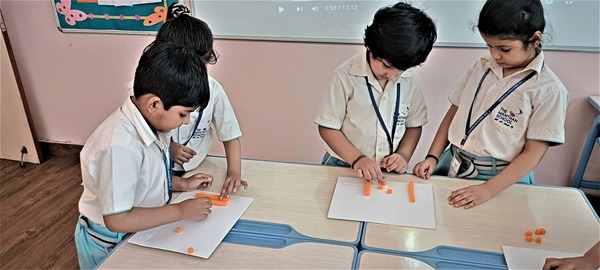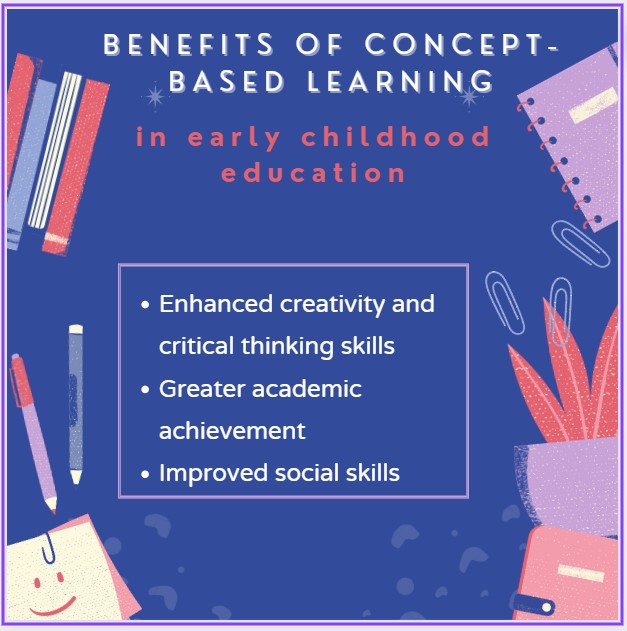Concept-based Vs Process-based Learning
Today’s school kids are growing up in a rapidly changing world, where technology is constantly evolving and new opportunities are emerging every day. To help them thrive in this increasingly digital world, it is important to teach them the essential learning patterns that will enable them to stay up-to-date and confident. Let’s dig into the topic in detail.
Concept-based Learning
At its core, concept-based learning in early years is a teaching approach that uses engaging activities
and real-world challenges to help kids build a strong foundation of knowledge and skills. By incorporating hands-on activities, games, and other immersive learning experiences into the
classroom, teachers are able to engage their students on a deeper level and instill a love of learning
that will last a lifetime. Whether you’re looking for ways to build strong foundational skills in maths,
reading, or other subjects, concept-based learning is an excellent approach for early learners.
While there are many different approaches to concept-based learning in the early years, one of the most
popular and effective methods is project-based learning. This approach brings together different
subject areas and challenges students to apply their knowledge in real-world settings. Through
hands-on activities, group work, and collaboration with peers, young learners can gain a deeper
understanding of the concepts they are studying while also developing essential communication and
teamwork skills.
If you’re interested in incorporating concept-based learning into your children’s school curriculum,
there are many resources available to help you get started. Many school districts have specific early
learning standards or frameworks that can provide guidance on the best teaching practices and
activities to use. Additionally, online resources like educational blogs, webinars, and professional
development courses can offer additional tips and strategies for making concept-based.
At a young age, kids are highly receptive to new concepts and ideas, making concept-based learning
an ideal approach for early childhood education. This type of teaching focuses on exploring different
concepts and theories through hands-on activities and interactive lessons, helping kids build critical
thinking skills, develop creativity, and gain a deeper understanding of the world around them.
Benefits of concept-based learning in early childhood education
Enhanced creativity and critical thinking skills
Through hands-on activities and interactive lessons, concept-based learning encourages kids to think creatively and critically about the world around them.
Greater academic achievement
By helping kids process information in a more meaningful way, concept-based learning can lead to improved academic performance and better long-term outcomes.
Improved social skills
Through collaborative activities and group discussions, concept-based learning helps kids develop important social skills like teamwork, communication, and leadership.
Process-based Learning
Process-based learning is a popular approach to early childhood education that focuses on providing
children with authentic, hands-on experiences in their school environment. This approach encourages kids to explore and experiment in order to learn about the world around them.
With this method, teachers guide students through different processes and encourage them to
discover new ideas and concepts through trial and error. Children are given the freedom to explore
their interests and follow their own unique learning paths, which helps foster creativity and a love of
learning.
Whether you are a school-aged child or the parent of one, there are many benefits to participating
in process-based learning activities. In addition to developing critical thinking skills, these activities
promote creativity, collaboration, communication, and problem-solving. Additionally, they help build
strong social bonds between children, as they are able to work together on group projects and
explore new interests together.
If you are interested in exploring process-based learning with your school-aged child or looking for
resources to support your child’s school curriculum, there are many resources available online.
Some great examples include educational websites and blogs, school lesson plans, and parent/teacher
forums where you can connect with other educators to share ideas and exchange tips for making
the most of this approach in your child’s learning journey.
The Benefits of Process-Based Learning for Kids
Education is constantly changing, and one of the most popular current trends is process-based learning. With process-based learning, kids learn by doing. They are encouraged to take an active role in their own education, exploring topics and ideas on their own. This type of learning teaches kids valuable critical thinking skills that will help them throughout their lives. Let’s take a look at some of the benefits of process-based learning for kids.
Active Learning Encourages Participation
When children are actively involved in their own education, they tend to be more engaged and
participate more fully in class activities. With process-based learning, students don’t just sit back and
listen; instead, they get to explore topics and ask questions in order to gain a deeper understanding
of the material. This encourages students to think critically about what they are learning and helps
them retain information better.
Develops Problem-Solving Skills
One of the major advantages of process-based learning is that it develops problem-solving skills in
students. By giving students open-ended tasks with no clear answer or solution, it encourages them
to think creatively about how best to approach a situation or solve a problem. This can help them
become independent thinkers who are able to make informed decisions when faced with real-world
challenges later on in life.
Teaches Resilience
In today’s world, it’s becoming increasingly important for children to learn how to be resilient and
cope with failure. Process-based learning allows children to experience failure firsthand as they
work through difficult problems without relying on teachers or parents for help every step of the
way. This helps them develop resilience as they learn that failure is not something to be feared but
rather an opportunity for growth and development.
Conclusion
One of the most important things for school-age kids is to learn through a combination of concept-
based and process-based methods. Concept-based learning focuses on understanding key concepts
and ideas, while process-based learning puts more emphasis on developing skills and abilities through
hands-on activities and tasks.
Both approaches have their benefits, and using a combination of both can help kids to build a strong
foundation in key skills and concepts. For example, by practicing problem-solving techniques through
hands-on activities and tasks, school-age kids can develop their critical thinking and analytical skills.
Meanwhile, learning about important concepts like maths or science can help kids to better
understand the world around them, and to develop their overall knowledge base.
Whether you’re a parent or teacher looking to support school-age kids in their learning, it’s important to focus on both concept-based and process-based approaches. With the right balance of
activities and tasks, school-age kids can gain a deeper understanding of key concepts and skills, and
develop the critical thinking and analytical abilities they need for success both in school and beyond.
Do you have any questions about concept-based and process-based learning for school-age kids? We
at The Manthan School, one of the best schools in Greater Noida West, would be happy to answer them. For more information, visit our website: www.themanthanschool.co.in/ or feel free to write to us at info.ne@manthan.edu.in or admission.ne@manthan.edu.in.

